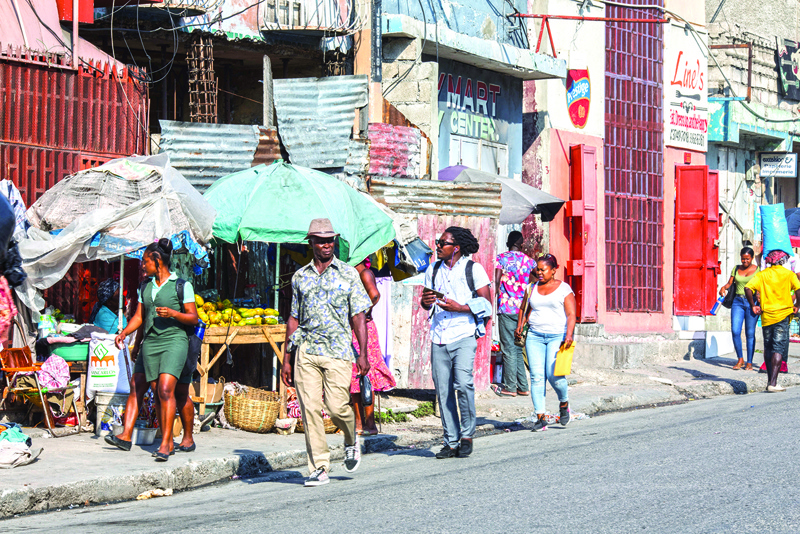 People walk down a street of Port-au-Prince. Half a century has passed since the April 1971 death of the elder Duvalier but Haiti is still struggling to achieve democracy. - AFP
People walk down a street of Port-au-Prince. Half a century has passed since the April 1971 death of the elder Duvalier but Haiti is still struggling to achieve democracy. - AFPPORT-AU-PRINCE, Haiti: When Haitian strongman Francois Duvalier died, his subjects had no choice on their next president-his 19-year-old son took over. The vote to approve him as successor was officially 2,391,916 to zero. Half a century has passed since the April 1971 death of the elder Duvalier but Haiti is still struggling to achieve democracy, with the Western Hemisphere's poorest nation again embroiled in twin crises of political illegitimacy and rampant violence.
Dubbed Papa Doc due to his background as a physician, the elder Duvalier was democratically elected in 1957 but soon built a ruthless authoritarian state that is believed to have killed tens of thousands of people in its quest to maintain power. Papa Doc also built a fearsome personality cult, reviving voodoo traditions to cast himself as a spirit of the dead and claiming through propaganda posters to have been selected by Jesus Christ.
Papa Doc also knew how to play the United States, which was panicked over Fidel Castro's revolution in nearby Cuba. When "Baby Doc" Jean-Claude Duvalier took over as the world's youngest leader, the United States was fully onboard thanks to the Duvaliers' fervent anti-communism.
The US ambassador, Clinton Knox, even had a T-shirt with the likeness of Baby Doc "so he could show the opposition, both overseas and inside the country, that he was their choice," said historian Pierre Buteau. Baby Doc, however, faced opposition as protests erupted across Haiti in the mid-1980s. In 1986, the United States finally parted ways with Baby Doc, who went into exile in France where he spent most of the rest of his life.
Democracy came to Haiti with the 1991 election of reformist priest Jean-Bertrand Aristide, but he was twice ousted in military coups. Haiti again faces question marks as President Jovenel Moise insists he is president through February 2022, rejecting claims by the opposition that his term ended in February 2021.
'You don't just move on'
Moise is championing a June referendum that would consolidate powers around the presidency amid soaring violence and kidnappings-including the abductions of seven Catholic clergy members-that last week prompted the cabinet to resign. "You don't just move on from one day to the next following a dictatorship that lasted 30 years and infected all of the country's institutions with a goal of staying in power as long as possible," said sociologist Laennec Hurbon.
The 1987 constitution set a 10-year ban on political participation by the Tontons Macoutes, the paramilitary unit-named for a bogeyman in Haitian folklore-that brutally enforced the Duvaliers' rule. Mobs carried out lynchings in which suspected militia members were burned alive with the rubber wheels around their necks. The attacks came to be known as "Pere LeBrun", after a local tire dealer.
But the Tontons Macoutes did not face trial and still enjoyed quiet relations with US intelligence as they joined the front lines of opposition to Aristide. "There was no conventional justice for the atrocities of the Macoutes, but there was justice by the people through Pere LeBrun," Buteau said.
With no formal accounting for crimes under the Duvaliers, the cruelty of the regime is being quickly forgotten in a country where more than half the population was born after Baby Doc fell. School textbooks do not even cover Haitian history after 1957. "The problem in Haiti is that the memories of the dictatorship are very weak," Hurbon said. "Many people continue to say that things were better in '86."
Politics for enrichment
The fall of the Duvaliers ended the idea of one-party rule. But it in turn triggered an avalanche of smaller parties motivated more by self-interest than broad ideas or constituencies. The last presidential election had no fewer than 54 candidates. "You can set up a party with 20 people. Today there are certainly more than 250 political parties," Hurbon said. "Many people believe they can obtain a better economic situation through the state and effectively we see people entering the political system for corruption." The end effect is little democratic participation by the general public, with just 21 percent voting in the last elections in 2016.
One shift came in 2018 when young people took to the streets en masse demanding answers on what successive administrations did with $1.6 billion contributed by Venezuela under its Petrocaribe initiative. Haiti's High Court of Auditors responded by producing three voluminous reports on rampant mismanagement of the money but Moise, named in one of them, clipped the wings of the court in November through a presidential decree.
Amid the political and economic vacuum, armed gangs have become a force to themselves in the poorest parts of the capital Port-au-Prince, contributing to the sharp rise in kidnappings for ransom. The political standoff lets the governing class avoid any trial over Petrocaribe corruption, the goal of the 2018 protests, Buteau said. "There are no longer large demonstrations because people are hungry and tired and hardened by poverty. In the face of insecurity, they are afraid." - AFP










